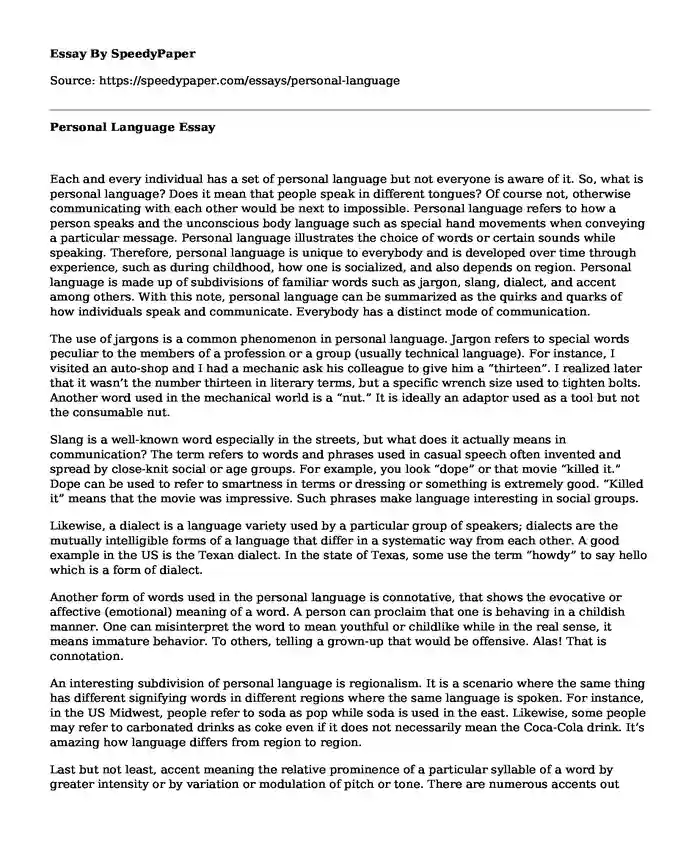
| Type of paper: | Essay |
| Categories: | Communication |
| Pages: | 3 |
| Wordcount: | 682 words |
Each and every individual has a set of personal language but not everyone is aware of it. So, what is personal language? Does it mean that people speak in different tongues? Of course not, otherwise communicating with each other would be next to impossible. Personal language refers to how a person speaks and the unconscious body language such as special hand movements when conveying a particular message. Personal language illustrates the choice of words or certain sounds while speaking. Therefore, personal language is unique to everybody and is developed over time through experience, such as during childhood, how one is socialized, and also depends on region. Personal language is made up of subdivisions of familiar words such as jargon, slang, dialect, and accent among others. With this note, personal language can be summarized as the quirks and quarks of how individuals speak and communicate. Everybody has a distinct mode of communication.
The use of jargons is a common phenomenon in personal language. Jargon refers to special words peculiar to the members of a profession or a group (usually technical language). For instance, I visited an auto-shop and I had a mechanic ask his colleague to give him a "thirteen". I realized later that it wasn't the number thirteen in literary terms, but a specific wrench size used to tighten bolts. Another word used in the mechanical world is a "nut." It is ideally an adaptor used as a tool but not the consumable nut.
Slang is a well-known word especially in the streets, but what does it actually means in communication? The term refers to words and phrases used in casual speech often invented and spread by close-knit social or age groups. For example, you look "dope" or that movie "killed it." Dope can be used to refer to smartness in terms or dressing or something is extremely good. "Killed it" means that the movie was impressive. Such phrases make language interesting in social groups.
Likewise, a dialect is a language variety used by a particular group of speakers; dialects are the mutually intelligible forms of a language that differ in a systematic way from each other. A good example in the US is the Texan dialect. In the state of Texas, some use the term "howdy" to say hello which is a form of dialect.
Another form of words used in the personal language is connotative, that shows the evocative or affective (emotional) meaning of a word. A person can proclaim that one is behaving in a childish manner. One can misinterpret the word to mean youthful or childlike while in the real sense, it means immature behavior. To others, telling a grown-up that would be offensive. Alas! That is connotation.
An interesting subdivision of personal language is regionalism. It is a scenario where the same thing has different signifying words in different regions where the same language is spoken. For instance, in the US Midwest, people refer to soda as pop while soda is used in the east. Likewise, some people may refer to carbonated drinks as coke even if it does not necessarily mean the Coca-Cola drink. It's amazing how language differs from region to region.
Last but not least, accent meaning the relative prominence of a particular syllable of a word by greater intensity or by variation or modulation of pitch or tone. There are numerous accents out there especially in English speaking countries and some can be fun to listen. The British accent is seen by some to be "higher" or classy and is different from the American English.
Lastly, idioms are essential in personal language. Idioms are words or phrases that cannot be translated literally. For instance, the phrase "that costs an arm and a leg" is idiomatic which means that something is very expensive. It doesn't mean the amputation of limbs to pay for something.
In conclusion, there are different facets and aspects of personal language and the coolest aspect is that it is distinct from one individual to another. People have different ways of conveying messages and how they speak defines their personal language.
Cite this page
Personal Language. (2022, Apr 21). Retrieved from https://speedypaper.net/essays/personal-language
Request Removal
If you are the original author of this essay and no longer wish to have it published on the SpeedyPaper website, please click below to request its removal:
- The most difficult academic problem you have overcome
- Educational Discharge Planning - Free Essay in Nursing
- Essay Examples: When Will the Use of Military Force Be Justified?
- Free Essay Sample: Jazz Concert Report
- Federalists and Democratic-Republicans - Free Essay in American Politics
- Impacts of Educational Programs on Recidivism Rates, Paper Example
- Essay Example on Principles of Good Practice in Undergraduate Education
Popular categories




